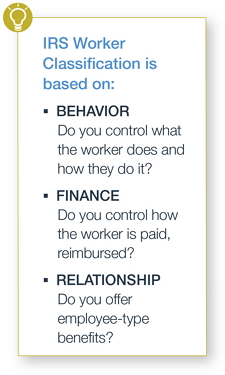Worker misclassification could
mean increased liability for income taxes and workers’ compensation claims.
It seems as if everyone is an
independent contractor these days. Janitorial staff, construction workers,
nurses, truckers, security guards, taxi cab drivers and entertainment creatives
are all exchanging employee ID badges for 1099s.
And yet, recent high-profile
lawsuits have revealed state and federal government distaste for worker misclassification.
A California Labor Commission recently ruled that Uber drivers are employees,
not independent contractors, since the company vets their drivers, dictates the
type of cars used and controls payments. Similarly, last year, a partnership of
construction companies in the Southwest paid out nearly $700,000 in back wages,
damages and penalties after a five-year federal investigation found that they
had purposefully worked together to misclassify employees.
Employers who misclassify
employees as independent contractors could be on the hook for federal and state
income, Social Security and Medicare taxes, unemployment taxes should the
worker be laid off and retroactive workers’ compensation coverage. This type of
expense across a fleet of workers could be crippling for an employer of any
size.
To be an employee or not to be an employee
So, how do you determine if a
worker is an employee or an independent contractor? The first step is to explore
the business relationship that exists between your company and the worker. A
general rule of thumb: the more control the business has over the worker, the
greater the chance they are considered an employee.
 According to the Internal Revenue
Service (IRS), worker classification can be determined by the following three
categories[1]:
According to the Internal Revenue
Service (IRS), worker classification can be determined by the following three
categories[1]:
- Behavioral: Does the company control or have the
right to control what the worker does and how the worker does his or her job?
- Financial: Are the business aspects of the
worker’s job controlled by the payer? This includes how the worker is paid,
whether expenses are reimbursed, who provides tools/supplies, etc.
- Type of Relationship: Are there
written contracts or employee-type benefits, i.e. pension plans, insurance,
vacation pay, etc.? Will the relationship continue and is the work performed a
key aspect of the business?
You may have answered yes to some of
these questions and no to others. All three categories must be considered in
tandem when determining if the worker is an employee or an independent
contractor. There is no magic number of factors that determines employee
status. Instead, employers must look at all these factors as a whole,
considering the degree of the control and independence of the worker.
If, after reviewing the three
categories of evidence above, the worker’s classification is still unclear, IRS
Form SS-8
can be submitted by either the worker or the business entity, and after review,
the IRS will make an official ruling on the worker’s status.
Employees require workers’ compensation coverage
Beyond taxes, though, employers are
required to carry workers’ compensation coverage for their employees, but not
for their independent contractors.
Workers’
compensation (WC) insurance provides medical, disability and rehabilitation
expenses for an employee who is injured in the course of their employment. WC coverage
is mandatory in the United States for all employees, and companies can be
penalized for not having a policy in place.
Misclassification is often the cause of a
workers’ compensation claim quandary. For example, when truckers -- sometimes
called owner-operators because of their independent contractor status -- face
an accident, which party is ultimately responsible for injuries and damages?
Are the truckers covered under their motor carrier’s WC policy or do they need
to have their own policy in place?
Similarly,
entertainment
firms or companies that hire workers by the project to serve as backstage personnel
or camera operators and then experience an accident while filming on location
will face such a dilemma as well. Can the workers file a claim on the firm’s WC
policy?
Know
your workers’ status
The IRS estimates that millions of
workers nationally are misclassified,[2]
and the consequences can be felt at both the state and federal level. State
governments are passing more laws to protect employee rights and crack down on
employers who aren’t meeting their obligations, while at the federal level increased
IRS audits are exposing unlawful employers.
Contact your HUB
Risk Services specialist to find out if your workers are considered
employees or independent contractors, and learn what your business needs to
know about worker classification in relation to workers’ compensation insurance.
[1] Independent Contractor (Self-Employed) or Employee?, IRS
[2] Misclassification of Employees as Independent Contractors, Department for Professional Employers